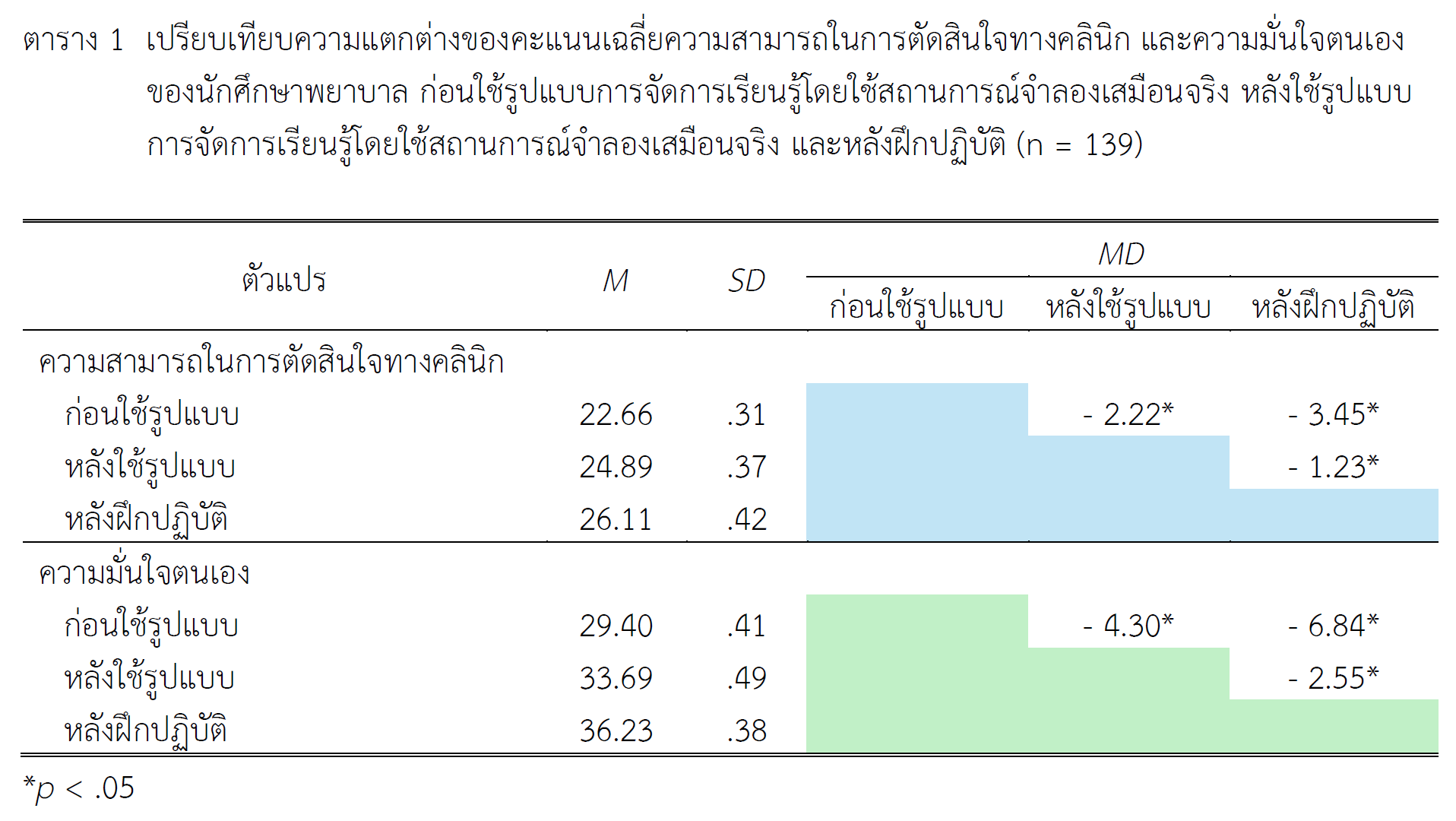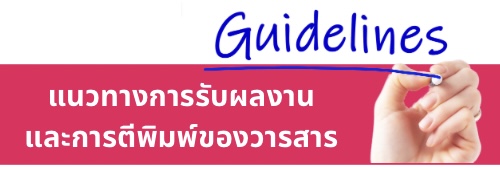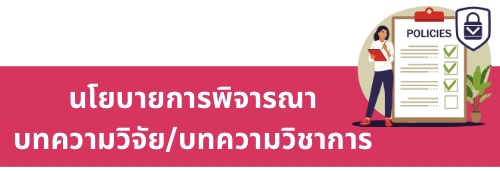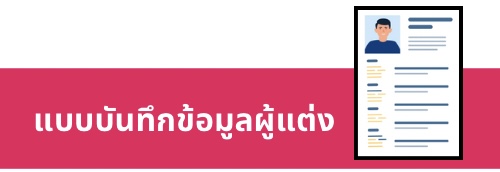การพัฒนารูปแบบการจัดการเรียนรู้โดยใช้สถานการณ์จำลองเสมือนจริงในรายวิชาการพยาบาลอนามัยชุมชนเพื่อส่งเสริมความสามารถในการตัดสินใจทางคลินิกและความมั่นใจของนักศึกษาพยาบาล
คำสำคัญ:
สถานการณ์จำลอง, การตัดสินใจทางคลินิก, ความมั่นใจบทคัดย่อ
การวิจัยครั้งนี้เป็นการวิจัยและพัฒนาเพื่อพัฒนารูปแบบการจัดการเรียนรู้โดยใช้สถานการณ์จำลองเสมือนจริงในวิชาการพยาบาลอนามัยชุมชนและศึกษาผลของการใช้รูปแบบเพื่อส่งเสริมความสามารถในการตัดสินใจทางคลินิกและความมั่นใจของนักศึกษาพยาบาล เครื่องมือที่ใช้ในการวิจัย คือ รูปแบบการจัดการเรียนรู้โดยใช้สถานการณ์จำลองเสมือนจริง ซึ่งผ่านการตรวจสอบคุณภาพโดยผู้เชี่ยวชาญ จำนวน 3 คน มีค่าดัชนีความตรงตามเนื้อหาเท่ากับ .91 และนำไปทดลองใช้ครั้งที่ 1 กับนักศึกษาชั้นปีที่ 3 ปีการศึกษา 2563 แล้วนำผลมาปรับปรุง หลังจากนั้น นำไปทดลองใช้ครั้งที่ 2 กับนักศึกษาพยาบาล ชั้นปีที่ 3 ปีการศึกษา 2564 เครื่องมือที่ใช้ในการเก็บรวบรวมข้อมูล ประกอบด้วย แบบวัดความสามารถในการตัดสินใจทางคลินิก และแบบประเมินความมั่นใจตนเอง มีค่าความเชื่อมั่นเท่ากับ .90 และ .89 ตามลำดับ วิเคราะห์ข้อมูลโดยใช้ร้อยละ ค่าเฉลี่ย และ Repeated measure MANOVA
ผลการวิจัยพบว่า
1. รูปแบบการจัดการเรียนรู้โดยใช้สถานการณ์จำลองเสมือนจริง ประกอบด้วย โจทย์สถานการณ์จำลองเสมือนจริง 4 สถานการณ์ ได้แก่ 1) การเยี่ยมบ้านผู้สูงอายุ 2) การเยี่ยมบ้านผู้ป่วยโรคเรื้อรัง 3) การตรวจสุขภาพนักเรียน 4) การเยี่ยมบ้านเด็กวัยก่อนเรียน การจัดกิจกรรมการการเรียนการสอนทำเป็นกลุ่มย่อย กลุ่มละ 8 คน ใช้เวลาในแต่ละสถานการณ์ 60 นาที แบ่งเป็นขั้นนำ 10 นาที ปฏิบัติสถานการณ์ 20 นาที และสรุปผลการเรียนรู้ 30 นาที
2. ผลการใช้รูปแบบจัดการเรียนรู้โดยใช้สถานการณ์จำลองเสมือนจริงพบว่า หลังการใช้รูปแบบการจัดการเรียนรู้โดยใช้สถานการณ์จำลองเสมือนจริงทำให้คะแนนเฉลี่ยความสามารถในการตัดสินใจทางคลินิกและความมั่นใจของนักศึกษาพยาบาล ดีขึ้นกว่าก่อนใช้รูปแบบ อย่างมีนัยสำคัญทางสถิติที่ระดับ .05
ข้อเสนอแนะ สถาบันการศึกษาทางการพยาบาลควรนำรูปแบบการจัดการเรียนรู้โดยใช้สถานการณ์จำลองเสมือนจริงไปใช้ในการเตรียมความพร้อมให้กับนักศึกษาพยาบาลก่อนการฝึกภาคปฏิบัติในรายวิชาปฏิบัติการพยาบาลชุมชน เพื่อพัฒนาการตัดสินใจในการปฏิบัติการพยาบาลและเพิ่มความมั่นใจของนักศึกษาพยาบาล
Downloads
เอกสารอ้างอิง
Chernikova, O., Heitzmann, N., Stadler, M., Holzberger, D., Seidel, T., & Fischer, F. (2020). Simulation-based learning in higher education: A meta-analysis. Review of Educational Research, 90(4), 499-541.
INACSL Standards Committee. (2016). INACSL Standards of best practice: Simulation Debriefing. Clinical Simulation in Nursing, 12(S), S21-S25.
INACSL Standards Committee, McDermott, D.S., Ludlow, J., Horsley, E., & Meakim, C. (2021). Healthcare simulation standards of Best PracticeTM Prebriefing: Preparation and briefing. Clinical Simulation in Nursing, 58, 9-13.
Maraphen, R., & Boonkoum, W. (2020). Development of learning instructional model by using standardized patient in simulation base in community health nursing (Doctoral dissertation), Silpakorn University, Nakhon Pathom.
Maraphen, R., Boonkoum, W., & Kheovichai, K. (2022). Effect of a learning instructional by using standardized patients as simulation in home visits. Thai Red Cross Nursing Journal, 14(1), 126-139.
Msosa, A., Msiska, M., Mapulanga, P., Mtambo, J., & Mwalabu, G. (2023). Simulation-based education in classroom and clinical settings in sub-Saharan Africa: A systematic review. Higher Education, Skills and Work-Based Learning, 13(6), 1126-1141.
Phormpayak, D., Sattayawong, W., Rattana-Umpa, J., Hamtanon, P., & Rungkavat, V. (2019). The effects of using simulation-based learning and reflective thinking skill promoting on nursing students’ reflective thinking behavior and clinical decision-making abilities. The Journal of Baromarajonani College of Nursing, Nakhonratchasima, 25(2), 57-71.
Pumput, P., & Puriwitthayatira, K. (2022). Effects of teaching using virtual simulations on preparing nursing students before practicing in mental health and psychiatric nursing practice. Nursing, Health, and Education Journal, 5(3), 37–46.
Punsomreung, T., & Kanhadilok, S. (2017). Clinical decision thinking. Journal of Nursing, Siam University, 18(35), 81-94.
Punsomreung, T., Kanhadilok, S., & Inchaitep, S. (2020). The Thai version of Lasater clinical judgement rubric (T-LCJR): Psychometric properties. Journal of Nursing and Education, 13(1), 14-26.
Sinthuchai, S., & Ubolwan, K. (2017). Fidelity simulation based learning: implementation to learning and teaching management. Journal of The Royal Thai Army Nurses, 18(1), 29-38.
Sinthuchai, S., Ubolwan, K., & Boonsin, S. (2017). Effects of high-fidelity simulation-based learning on knowledge, satisfaction, and self-confidence among the fourth-year nursing students in comprehensive nursing care practicum. Ramathibodi Nursing Journal, 23(1), 113-127.
Suksawatdiporn, P., Pasiphol, S., & Na-songkhla, J. (2019). Development of the clinical judgement test in obstetric nursing for nursing students. Journal of The Police Nurses, 11(2), 464–473.
Thammakijpirote, T., Maneewong, J., & Sanongyard, J. (2023). Simulation-based learning on critical thinking of nursing students in Thailand: A systematic review. The Journal of Boromarjonani College of Nursing, Suphanburi, 6(1), 5-28.

ดาวน์โหลด
เผยแพร่แล้ว
รูปแบบการอ้างอิง
ฉบับ
ประเภทบทความ
สัญญาอนุญาต
ลิขสิทธิ์ (c) 2025 วารสารพยาบาลตำรวจและวิทยาศาสตร์สุขภาพ

อนุญาตภายใต้เงื่อนไข Creative Commons Attribution-NonCommercial-NoDerivatives 4.0 International License.
ผลงานที่ได้ตีพิมพ์แล้วจะเป็นลิขสิทธิ์ของวารสารพยาบาลตำรวจ














